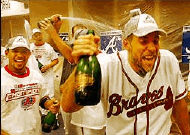Rebuilt Braves have saved, are not spent
Rebuilt Braves have saved, are not spent
In the late innings of his distinguished career, Braves general manager John Schuerholz has become baseball's ultimate comparison shopper, tire kicker, coupon clipper, and pursuer of fixer-uppers. Not by choice, but by necessity. Last week he and his staff put the final touches on the latest Braves rebuilding project, assembling what they believe is a contending team while meeting an ownership-mandated $80 million payroll -- modest by today's standards.
"Last year we had to think outside the box," said Schuerholz, whose moves before the 2004 season included a trade for injury-plagued right fielder J.D. Drew, who proceeded to have a healthy, career-best season for Atlanta, then left. "This year," Schuerholz said, "we had to think way outside the box." It was one thing to hand right field over to Drew, and quite another to have the outfield corners manned by well-traveled Raul Mondesi and 37-year-old Brian Jordan, who between them totaled eight homers and 38 RBIs in 2004. The 13-time division champions signed those two to contracts worth a mere $1.6 million guaranteed, and tge total commitment to six newcomers was $12.76 million, including former Oakland ace Tim Hudson and Milwaukee closer Dan Kolb.
In contrast to Atlanta's creative tinkering and one-year commitments, the rival New York Mets spent $198 million for free agents, including $119 million on Carlos Beltran and $53 million on Pedro Martinez. And they're still talking to free-agent first baseman Carlos Delgado and discussing a Samma Sosa trade. "I learned long ago, headlines don't win championships," Schuerholz said. "Team building does." The Dodgers spent more than $140 million this winter on free agents, including $55 million for Drew. Seattle spent $122 million. Boston spent $120 million. "I've got to keep my head down and my eye on this ball," Schuerholz said, "not look at what other teams are spending or headlines they're making. I feel very good about the way we've built our team for 15 years, and I feel good about it this year."
[...]
McGuirk believes an $80 million payroll enables -- some say forces -- the Braves to have a good mix of veterans and youngsters, and better utilize the farm system. Veterans are great, and give you a lot of certainty," McGuirk said. "But that is exciting to fans when you have a young guy breaking out of the minors. That's part of the tradition of baseball. "Our minor league system gets a lot more competitive now, because they know if they can excel they can break out and have a chance. It's not like in years past, when if you were in our minor league system you were never coming out unless there was a trade."
After winning the National League East with an $80 million payroll in 2004, the Braves lost their top hitter (Drew) and both 15-game winners (Jaret Wright, Russ Ortiz) to free agency. The Braves got Hudson and Kolb and paid large raises to arbitration-eligibles, including Rafael Furcal and Marcus Giles, just about wiping out available funds. "John said last year, 'I have a team that can win the East,' and not many people believed it," McGuirk said. "I think he's taken that team and I think he's bettered it because of all those young guys -- we took some chances last year on [young] guys that had to perform, and they did perform. "So he's really one more rung up the ladder as he goes about setting this year's team in place."
It's not like in years past, when the Braves could fill a hole by targeting a free agent and swooping in with an offer he couldn't refuse. Today they depend on Schuerholz and staff to find hidden gems and players coming back from injury or other circumstances, and hope manager Bobby Cox and staff get maximum production from them -- which they do, more often than not. The Braves have been able to keep alive their unprecedented divisional run. But veteran players, and fans, want badly to get a second World Series ring.
Schuerholz said the Braves decided to go back to their old style of winning with dominant pitching after going into recent postseasons without a starter to match Chicago's Kerry Wood and Mark Prior or Houston's Roger Clemens. They rebuilt the rotation by getting Hudson and Kolb, whose arrival permits former 24-game winner Smoltz to get his wish of being a starter again. Hudson will make $6.75 million and be eligible for free agency after the season. Kolb was eligible for arbitration and settled for $3.4 million.
Mondesi and Jordan are the only proven outfielders the Braves acquired after trading left fielders Eli Marrero and Charles Thomas and losing free agent Drew. Have the Braves gambled by not adding another, less-questionable bat? Have they left too many holes in their bullpen? Have they weakened the defense? "I don't feel that way," Schuerholz said. "I guess if we had all the money and resources and could have put together a $200 million payroll, we probably would have gone about this a little differently. "But with an $80 million payroll -- which nobody's apologizing for; we won 96 games last year and were good enough to get to the World Series but just didn't get there -- with an $80 million payroll, I really feel good about how this has worked out. Eighty million is more than enough to put a winning team on the field."
The Braves will again put that belief to the test this season.
Indeed. What Schuerholz and Cox have achieved over the last 14 seasons is simply remarkable. To maintain the streak with a comparatively meager salary, though, will be something else. The Marlins and Mets, on paper, are much better teams. I certainly wouldn't count the Braves out, though.


0 Comments:
Post a Comment
<< Home